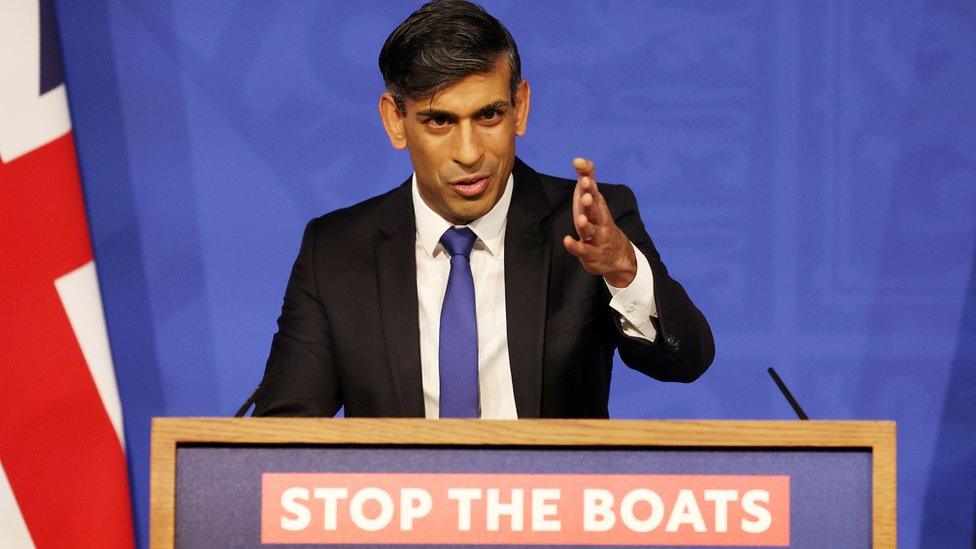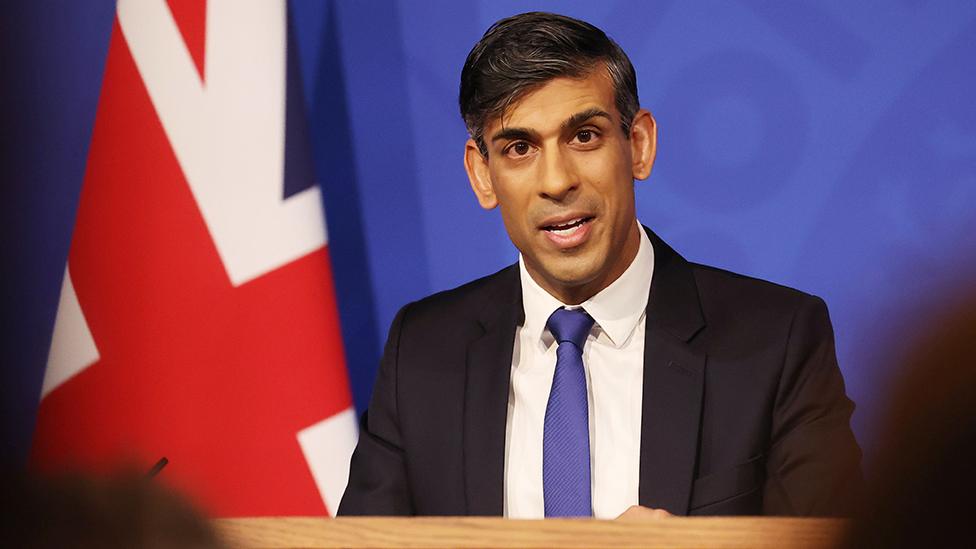Rishi Sunak’s Rwanda law at mercy of Tory factions
- Published

A "Stop the Boats" lectern and a defiant appeal to unite behind the UK government's plan to send some asylum seekers to Rwanda.
These were the optics and the message chosen by a prime minister in the midst of a deepening political crisis.
By holding a TV news conference in Downing Street, Rishi Sunak's intention was to seize the narrative and amplify his attempt to revive the Rwanda policy to as wide an audience as possible.
But some of his words appeared to be carefully selected with a target audience in mind - unruly MPs from different factions of his party.
"What everyone should do is support this bill," Mr Sunak said.
The fate of the Rwanda scheme hinges on the passage of the Safety of Rwanda Bill., external
Mr Sunak said the new law was the "only approach" that would successfully prevent further legal challenges stopping flights taking off to Rwanda.
But the Conservative Party is split over the bill and the prime minister's news conference doesn't seem to have done much to calm tensions among MPs.
More than a year into Mr Sunak's premiership, MPs from different factions of the party are in open revolt over the Rwanda scheme - a legacy project of Boris Johnson's government.
That includes the so-called One Nation group - perceived as the more centrist and moderate wing of the party. And the so-called European Research Group (ERG) - an influential group of Brexiteer MPs on the right wing of the party.
The groups may be familiar to those who remember the tumultuous Brexit days, and the headache they gave former Prime Minister Theresa May as she tried, and ultimately failed, to appease them both.
Three prime ministers later, and both groups are back at the centre of another political whirlwind.
Legal advice
With the Rwanda bill due back in Parliament next week, both groups are taking legal advice before deciding whether to back it, or move against it.
Enter the ERG's Star Chamber, who, we're told, are studying the bill "forensically".
They feel Robert Jenrick's resignation as immigration minister was very significant and are not expected to give a judgement on whether they'll vote for or against the bill, or try change it, for a few days. Many worry it leaves the government too open to individual appeals by asylum seekers, with the European Court of Human Rights (ECHR) in Strasbourg still able to challenge deportations.
The One Nation group of MPs are being given legal advice by Lord Garnier, a former government solicitor general.
His verdict?
"I won't vote for it [in the House of Lords]," Lord Garnier told the BBC.
"It's an extraordinary bill - it's trying to define things when there is no evidence for that being the case. It's rather like a bill that has decided that all dogs are cats."
Watch: My patience with Rwanda plan has worn thin - Sunak
The bill compels judges to treat Rwanda as a safe country and gives ministers the powers to disregard sections of the Human Rights Act.
Mr Sunak said the bill addresses the concerns of the Supreme Court, which ruled the Rwanda scheme unlawful last month.
Lord Garnier isn't so sure: "It makes political nonsense and it makes legal nonsense."
The group that's taking legal advice from Lord Garnier are nervous and share these concerns too.
Again, their position on whether to back the bill or not - or try to change it - is still undecided and it's likely they'll come to a conclusion in the coming days.
Rebellion looms
The bill is set to get its second reading in Parliament on Tuesday, when MPs will get to vote on it. Some may wait until later stages of the bill's passage to rebel or amend the draft law.
Mr Sunak has indicated that if Tory MPs do vote against the bill, they would not be thrown out of the party.
The vote next Tuesday, Mr Sunak said, was about "confidence in Parliament to demonstrate that it gets the British people's frustration", not confidence in his government.
This all has quite an air of 2018 about it, when Mrs May found herself at the centre of rebellions from different sides over her Brexit legislation.
Some MPs fear Mr Sunak is repeating what they see as the mistakes of the past.
As one MP put it, his news conference earlier seemed to be "channelling Theresa May" to talk to MPs via the television - rather than more effectively in person.
The unheeded ultimatums and the mutinous spirit that brought down Mrs May and other previous Tory prime ministers haunt Mr Sunak at a moment of political peril.
At the news conference, Mr Sunak was asked if he was telling Tory MPs to "back me or sack me", a phrase used by former Tory Prime Minister John Major when he faced a leadership challenge in 1995.
In his answer, Mr Sunak may have done something rare these days and spoken for his whole party when he said: "My patience with this has worn thin."
Related topics
- Published7 December 2023

- Published7 December 2023

- Published17 January 2024
